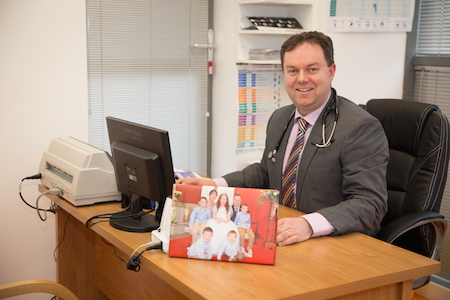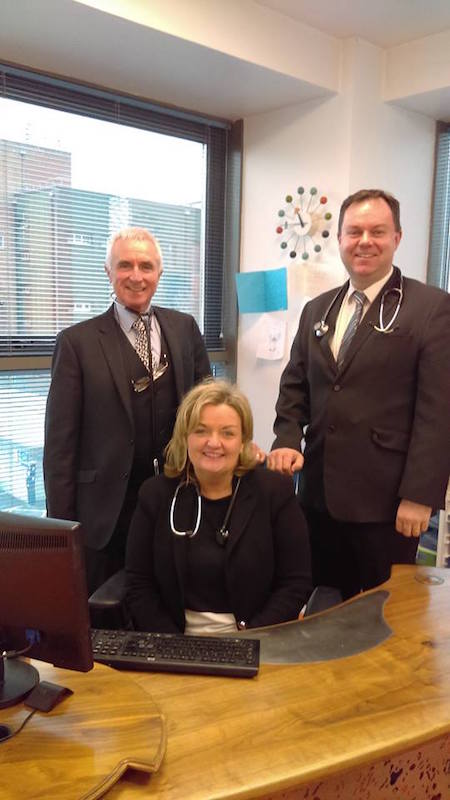Continuing our very popular series, Medical Matters, well-known GP Ciaran Roarty, deals with the issue of sleep of lack of it.
Sleeping problems are very common and often affect people in many different ways.
Up to 30% of the adult population can have sleep problems and sleeping difficulties are more common in women, children and over 65s.
There is no “correct” amount of sleep because the amount of sleep needed varies throughout our life and also between people.
For an adult 7-9 hours is recommended but we know that many people can range from 6-10 hours per night. Sleep in older people tends to be shorter, more restless and more easily disturbed but is should be refreshing nonetheless. This is because older people spend less time in “deep sleep”.
There can be a number of causes of sleep problems. It can be related to our age, or medical conditons or sometimes to emotional disturbances. Depression, menopause, pain, breathing difficulties may all affect our sleep so it is worth discussing these with your doctor. Stress and anxiety will also affect our sleep.
Unsuitable surroundings ( eg a bedroom that is too warm or a noisy room) and disrupted sleep routines ( eg shift working) can also play a role.
There are different sorts of sleep problems eg not being able to fall asleep, not being able to stay asleep, poor quality sleep, sleeping too much or waking too early. We can have a mixture of these problems but knowing which can help your doctor advise you correctly.
It is also sometimes possible to think we have a sleep problem when in fact we are getting enough sleep, albeit different to what we might be expecting.
Looking for possible causes and trying to identify solutions is the first step in dealing with sleep difficulties. For example worring about not getting enough sleep may actually make things worse. Trying to find relaxation techniques such as slow deep breathing which reduces our heart rate and our cortisol levels (a hormone released when we are anxious) helps. Focusing or allowing ourselves daydream about something pleasant such as a recent relaxing holiday can also help. There are free online recordings on relaxation techniques.
If getting up to the toilet frequently is an issue there may be a medical reason and it is worth getting that checked out. Pain should be treated. We know anxiety and depression and stress related sleeping difficulties are helped by getting help for these issues. Remembering the phrase “I will deal with this tomorrow” helps us steer our mind away from worrying thoughts at night.
Sleep apnoea is a condition seen sometimes in people who are overweight. Snoring, pausing and gasping frequently during our sleep and daytime tiredness after an apparently good nights sleep may be suggestive of this. It can be treated with lifestyle changes, weight loss , alcohol reduction and sleeping on your side as well as other treatments. Your doctor can advise.
GOOD SLEEP HABITS
The techniques below have been proven to work but take time and hard effort. If you feel you are making little progress or the problem is getting worse then speak with your GP.
1. Dont worry about sleep – you may actually be getting enough.
2. Don’t nap during the day – it disrupts your natural rhythm.
3. Improve your surroundings – take care of noise, light, electronic devices emitting lights, uncomfortable pillows or mattresses,incorrect room temperatures or noisy other half! Ear plugs or spare room may help.
4. Food and drink – No caffeine near bedtime – eg coffee, tea, hot chocolate (contains caffeine) or coke. Malty drinks may help.
5. Cigarettes – nicotine is a stimulant so no cigarettes ( or patches or gum) for at least 4 hours before bedtime if possible.
6. Medicines – eg some asthma or migraine medicines can affect your sleep as they are stimulants. You can discuss these with your pharmacist or doctor. Sleeping tablets may help for a short while but often actually CAUSE sleep problems because they interfere with our sleep quality and sleep patterns. They should only be taken for a short while after discussion with your GP.
7. Alcohol affects sleep quality and so it’s best to avoid large amounts close to bedtime.
8. Develop a regular pattern – this helps the body know where it is. Avoid lying on more than an hour at the weekend. Develop a routine in the hour before you go to bed to wind down eg calming music, dim lights etc.
9. Activity helps – but during the day. Dont exercise too near bedtime.
10. Electronic devices can emit a blue light that stimulates the brain and affects melatonin production. They should be avoided in the hour before bedtime.
11. Don’t go to be until you feel tired and get up if you are still awake after 20 minutes. Listen to relaxing music, read a book or have a milky or malty drink.
12. Bed is for sleeping so don’t use it to watch tv, work on your laptop, eat or talk on the telephone.
Be patient and try these suggestions which can improve your sleep. They may take hard work and it may be weeks to see an effect but they have been shown to help.
The above information is intended as advice only and should you have any concerns contact your own Doctor.
Dr Ciaran Roarty MB BCh BAO MICGP DRCOG is a full-time GP at Scally McDaid Medical Practice, Scally Place, Letterkenny, Tel 0749164111
Tags:








